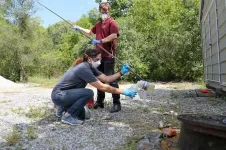EMBARGOED FOR RELEASE UNTIL 4 P.M. ET, WEDNESDAY, NOVEMBER 6, 2024
MINNEAPOLIS – Older people who are sleepy during the day or lack enthusiasm for activities due to sleep issues may be more likely to develop a syndrome that can lead to dementia, according to a study published in the November 6, 2024, online issue of Neurology®, the medical journal of the American Academy of Neurology.
People with the syndrome have a slow walking speed and say they have some memory issues, although they do not have a mobility disability or dementia. Called motoric cognitive risk syndrome, the condition can occur before dementia develops.
The study found that people with excessive daytime sleepiness and a lack of enthusiasm to get things done were more likely to develop the syndrome than people without those sleep-related issues. The study does not prove that these sleep-related issues cause the syndrome, it only shows an association.
“Our findings emphasize the need for screening for sleep issues,” said study author Victoire Leroy, MD, PhD, of Albert Einstein College of Medicine in the Bronx, New York. “There’s potential that people could get help with their sleep issues and prevent cognitive decline later in life.”
The study involved 445 people with an average age of 76 who did not have dementia. Participants took questionnaires for sleep at the start of the study. They were asked about memory issues and their walking speed was tested on a treadmill at the start of the study and then once a year for an average of three years.
The sleep assessment asked questions such as how often people had trouble sleeping because they wake up in the middle of the night, cannot fall asleep within 30 minutes, or feel too hot or cold and whether they take medicine to help them sleep. The question to assess excessive daytime sleepiness asks how often people have had trouble staying awake while driving, eating meals or engaging in social activity. The question on enthusiasm asks how much of a problem people have had keeping up enough enthusiasm to get things done.
A total of 177 people met the definition for poor sleepers and 268 met the definition for good sleepers.
At the start of the study, 42 people had motoric cognitive risk syndrome. Another 36 people developed the syndrome during the study.
Of those with excessive daytime sleepiness and lack of enthusiasm, 35.5% developed the syndrome, compared to 6.7% of the people without those problems. Once researchers adjusted for other factors that could affect the risk of the syndrome, such as age, depression and other health conditions, they found that people with excessive daytime sleepiness and lack of enthusiasm were more than three times more likely to develop the syndrome than those who did not have those sleep-related problems.
“More research needs to be done to look at the relationship between sleep issues and cognitive decline and the role played by motoric cognitive risk syndrome,” Leroy said. “We also need studies to explain the mechanisms that link these sleep disturbances to motoric cognitive risk syndrome and cognitive decline.”
A limitation of the study is that participants reported their own sleep information, so they may not have remembered everything accurately.
The study was supported by the National Institute on Aging.
Learn more about brain health at BrainandLife.org, home of the American Academy of Neurology’s free patient and caregiver magazine focused on the intersection of neurologic disease and brain health. Follow Brain & Life® on Facebook, X and Instagram.
When posting to social media channels about this research, we encourage you to use the hashtags #Neurology and #AANscience.
The American Academy of Neurology is the world's largest association of neurologists and neuroscience professionals, with over 40,000 members. The AAN’s mission is to enhance member career fulfillment and promote brain health for all. A neurologist is a doctor with specialized training in diagnosing, treating and managing disorders of the brain and nervous system such as Alzheimer's disease, stroke, concussion, epilepsy, Parkinson's disease, multiple sclerosis, headache and migraine.
For more information about the American Academy of Neurology, visit AAN.com or find us on Facebook, X, Instagram, LinkedIn and YouTube.
END
Sleepiness during the day may be tied to pre-dementia syndrome
2024-11-06
(Press-News.org)
ELSE PRESS RELEASES FROM THIS DATE:
Research Spotlight: Higher brain care score found to improve brain health regardless of genetic risk
2024-11-06
Christopher D. Anderson, MD, MSc, chief of the Division of Stroke and Cerebrovascular Diseases at Brigham and Women’s Hospital and associate neurologist in the Department of Neurology and Center for Genomic Medicine at Massachusetts General Hospital, is the corresponding author and Jonathan Rosand, MD, MSc, co-founder of the McCance Center for Brain Health and neurologist in the Department of Neurology and Center for Genomic Medicine at Massachusetts General Hospital, is an author of a paper published on November 6, 2024, in Neurology®, the medical journal of the American Academy of Neurology, “Health-related behaviors ...
Variation in the measurement of sexual orientations is associated with sexual orientation-related mental health disparities
2024-11-06
Sexual orientation—dictated by factors like sexual identity, attraction and behavior—is challenging to measure comprehensively. This is reflected in variations in the number of lesbian, gay, bisexual and transgender people recorded across surveys using different measurement approaches. Most approaches focus on ‘sexual identity’ to understand mental health disparities, but differences in perceived notions of ‘identity’ and ‘attraction/behavior’ are prevalent. For instance, some ...
Study shows how high blood sugar increases risk of thrombosis
2024-11-06
A study conducted at the Center for Research on Redox Processes in Biomedicine (Redoxoma) helps understand how high blood sugar (hyperglycemia), one of the manifestations of diabetes, can cause thrombosis. The findings, reported in an article published in the Journal of Thrombosis and Haemostasis, can contribute to the development of strategies to prevent cardiovascular dysfunction in diabetics.
“The leading causes of death in Brazil and several other Latin American countries ...
Cachexia decoded: Why diagnosis matters in cancer survival
2024-11-06
Maintaining good health and well-being is crucial for how well patients respond to cancer treatments. Unfortunately, cachexia, or involuntary weight loss, is a major concern for many individuals with advanced cancer. A new study from Japan has revealed that lower cachexia rates, particularly with prevalence less than 40–50%, are linked to shorter overall survival (OS) rates. The study also showed that the diagnostic criteria used for cachexia detection can affect the reported cachexia prevalence.
People with advanced heart disease or cancer often face serious health challenges. Cachexia, an involuntary loss ...
Transportation institute awarded nearly $1 million in trucking education grants
2024-11-06
Safety is not only for truck drivers, but also the drivers around them.
The Virginia Tech Transportation Institute recently received nearly $1 million in two grants from the U.S. Department of Transportation’s Federal Motor Carrier Safety Administration to develop and enhance tractor-trailer educational programs.
“These two grants will allow us to continue transforming our research into practice,” said Rich Hanowski, director of the institute's division of freight, transit, and heavy vehicle safety. “The outreach initiatives will directly leave an impact on drivers ...
Sewage surveillance proves powerful in combating antimicrobial resistance
2024-11-06
Waterborne diseases affect over 7 million people in the U.S. every year, according to the Centers for Disease Control and Prevention, and cost our health care system over $3 billion. But they don’t impact all people equally.
A campuswide collaboration is using sewage surveillance as a vital strategy in the fight against diseases that spread through the water such as legionella and shigella. The ones that are most difficult to combat are diseases with antimicrobial resistance, which means they are able to survive against antibiotics that are intended to kill them.
A recent paper in Nature Water offers an encouraging insight: Monitoring ...
Natural environment is declining: are companies doing their part to save it?
2024-11-06
The natural environment across the globe is deteriorating, leading to crises like climate change, biodiversity loss, and water scarcity. Companies and industries play a major role in this decline, and they are expected to take responsibility for their environmental impact. A recent study by Probal Dutta from the University of Vaasa, Finland, suggests that companies can meet these expectations by openly sharing reliable, credible information about their activities, environmental performance, and effects on nature.
Probal Dutta’s doctoral dissertation at the University ...
New study sheds light on the role of sound and music in gendered toy marketing
2024-11-06
A groundbreaking study from Queen Mary University of London reveals that the music and soundscapes used in toy commercials are reinforcing rigid gender norms, shaping the way children perceive masculinity and femininity. The research uncovers how gender stereotypes are not only conveyed through visuals and language but are also deeply embedded in the sound and music used in advertisements targeted at children.
For more than 40 years, research has shown how gender polarisation in children’s ...
Pathogens which cling to microplastics may survive wastewater treatment
2024-11-06
Wastewater treatment fails to kill several human pathogens when they hide out on microplastics in the water, reports a new study led by Ingun Lund Witsø of the Norwegian University of Life Sciences, published November 6, 2024 in the open-access journal PLOS ONE.
Wastewater treatment plants are designed to remove contaminants from wastewater, but microplastics persist and can become colonized by a sticky microbial biofilm. Previous research has suggested that these microbial communities, called plastispheres, include potential pathogens, and thus might pose a risk to human health and the environment when treated wastewater and sludge are released.
In the new study, researchers ...
Effects of preterm birth extend into adulthood, study finds
2024-11-06
By analyzing all live births in Canada over a six-year period and following children for more than two decades, researchers found that preterm births and the related cognitive, development and physical health impacts of prematurity are associated with lower income, employment and university enrollment
Individuals born before 37 weeks of gestation, considered to be preterm infants, have, on average, lower employment income, university enrollment and educational attainment through age 28, according to ...






